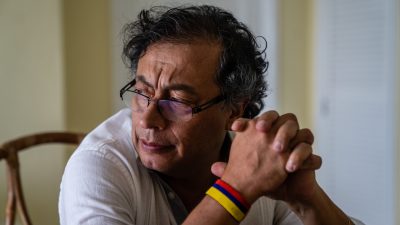Gustavo Petro’s Election Victory: Regime Change En Route to Colombia?

All Global Research articles can be read in 51 languages by activating the “Translate Website” drop down menu on the top banner of our home page (Desktop version).
To receive Global Research’s Daily Newsletter (selected articles), click here.
Visit and follow us on Instagram, Twitter and Facebook. Feel free to repost and share widely Global Research articles.
***
Gustavo Petro’s victory in Sunday’s Colombian Presidential election, marking the first time Bogotá has elected a left-wing head of state, was not the only far-reaching geopolitical event to recently take place involving Latin America.
A week prior to the former guerrilla fighter’s electoral success, President Nicolás Maduro of neighbouring Venezuela paid an official two day visit to Iran where he signed an official 20-year cooperation agreement with Iranian head of state Ayatollah Khameini – a deal intended to counter the wide-ranging US sanctions targeting both Caracas and Tehran.
With one of Petro’s Presidential aims being to develop further relations with Venezuela however, his incoming Presidency has undoubtedly already been placed in the sights of the regime change lobby, wary that friendly relations between Bogota, Caracas and Tehran, will undermine US-NATO hegemony from South America all the way to the Middle East.
Indeed, CIA involvement in fomenting regime change in Latin America has a history stretching back more than half a century.
In 1970, at the height of Cold War tensions between East and West, the election of Socialist candidate Salvador Allende in Chile, and his subsequent nationalisation of Santiago’s lucrative copper mining industry and telecommunications sector, would quickly draw the ire of Washington.
With corporate interests at stake, and fearing that socialism would take root on its doorstep, a plan was hatched by the White House to remove Allende’s Left-wing government.
On September 11th 1973, a bloody CIA-backed coup was launched in Chile, which would see the death of Allende, officially by suicide but with foul play highly suspected, and the seizing of power by the US-backed General Augusto Pinochet, whose 17-year long reign would see the extrajudicial killing of more than 3,000 left-wing activists, and the further forced exiling of 200,000 more.
The instalment of Pinochet’s leadership would subsequently lead to the CIA launching Operation Condor, a Cold War initiative intended to halt the spread of Communism in South America via the covert backing of right-wing political movements in the region.
Like Chile, Bolivia, Paraguay, Uruguay and Brazil had also come under the rule of military dictatorships, Argentina following in 1976, with each receiving the full support of the United States.
Despite the end of the Cold War following the Soviet Union’s collapse in 1991 however, this US interference in Latin America would continue unabated, most recently seen in 2020 when Operation Gideon, a failed Bay of Pigs-style coup attempt involving US mercenaries and most likely sanctioned covertly by the White House, was launched in order to remove the Venezuelan leadership of Nicolás Maduro – a long-time target of the regime change lobby since he was elected as President of the oil-rich nation following the death of Hugo Chávez in 2013.
Coming just a year after another failed coup attempt in the Latin American country, involving US-backed ‘Interim President’ Juan Guaidó, the motivation for Maduro to further develop relations with Iran, following Tehran’s May 2020 export of almost two million barrels on Iranian oil to Venezuela in order to counter US sanctions, should be clear.
Like Venezuela, the Islamic Republic has also been a long-time opponent of the US-NATO hegemony, when following the 1979 Islamic Revolution, the anti-American Ayatollah Khomeini would come to power, overthrowing the Western-backed Shah Pahlavi, who had himself been installed in a 1953 CIA and MI6 orchestrated coup launched in response to then-Iranian Prime Minister Mohammad Mosaddegh’s decision to nationalise his country’s vast oil reserves.
With striking similarities between both Venezuela and Iran in terms of nationalisation of natural resources, opposition to US Imperialism, and being subject to Western sanctions, it would only seem natural that both countries would seek to develop diplomatic relations, it would also only seem natural that with the election of Gustavo Petro in Colombia, and his campaign promise to normalise relations with Venezuela, that Bogotá may soon also experience the same regime-change attempts that have previously befell both Caracas and Tehran.
*
Note to readers: Please click the share buttons above or below. Follow us on Instagram, Twitter and Facebook. Feel free to repost and share widely Global Research articles.
Gavin O’Reilly is an activist from Dublin, Ireland, with a strong interest in the effects of British and US Imperialism. Secretary of the Dublin Anti-Internment Committee, a campaign group set up to raise awareness of Irish Republican political prisoners in British and 26 County jails. His work has previously appeared on American Herald Tribune, The Duran, Al-Masdar and MintPress News. He is a regular contributor to Global Research. Support him on Patreon.
Featured image is from Twitter

